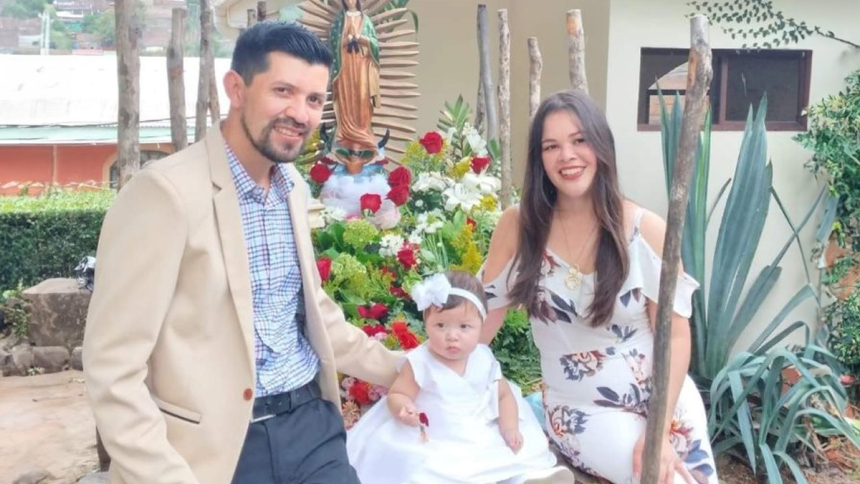
My name is Sergio José Cárdenas Flores; I was born in Nicaragua. Today, I am 33 years old, married and have a daughter who is 2 years old. I was a cameraman for the Diocese of Matagalpa.
Now you may be wondering, what am I doing in the USA…in Michigan?
I want to explain by sharing what’s happening in my country. In April 2018, protests broke out in Nicaragua against the reform to the Social Security System. This led to a series of demonstrations against the government of Daniel Ortega, who responded with great force, leaving hundreds dead, hundreds imprisoned and thousands displaced.
The Catholic Church was the mediator of everything in hopes that a peaceful agreement could be reached between the government and the people.
The Nicaraguan government has called the Catholic Church in Nicaragua “coup perpetrators” and “terrorists” for defending human rights. In one of his recent statements, President Ortega even called Pope Francis and the Catholic Church the “mafia.”
On Aug. 4, 2022, I went to work to prepare for the live transmission of a Mass. It was Thursday. There were policemen outside the Chapel of the Blessed Sacrament and the bishop’s home. I did not take it seriously at first. But while I was inside the Blessed Sacrament Chapel, the police told me to get out. They searched me and told me that I could not enter the Blessed Sacrament Chapel for the live transmission.
Bishop Rolando Alvarez of the Diocese of Matagalpa came out of the curia to see what was happening. Because they would not let us enter, some people were singing a Lenten song outside. Bishop Alvarez decided to take the Blessed Sacrament to the people who were singing and crying. The police then decided to close the streets around the curia for almost 200 meters all around. Eventually, we all entered the Chapel of the Episcopal Curia. We celebrated and broadcasted the Mass; the broadcast ended at 10 a.m. We decided to go out to do another broadcast from a parish called St. John Vianney, but now the police would not let us leave.
We were locked up for 15 days right there in the curia — in “survival mode” without access to food, only what was already inside, which was little. On day 15, the police entered through the roof of the curia at 3 a.m., by order of the government and put us in jail.
They took us to the prison in Managua. There were seven of us taken — three priests, one deacon, two seminarians and a layman — me.
Monsignor Rolando Álvarez was taken to his family home in Managua and placed under house arrest.
The trip to the prison, “El Chipote,” was difficult. We had to go in handcuffs with our hands behind our necks and our heads bent down, unable to see anything for approximately three hours. We also had no shoes and no shirts.
When we arrived at the prison, we were stripped and made to do squats, then each of us was placed in a small cell of one square meter.
Eventually, they took us to another cell, where there was bright light 24/7. We could not sleep. It was really confusing. We did not know the time, the weather etc….
But I was always filled with encouragement and strength from the prayers of the people, even though I was in prison. I felt good about myself. I felt so confident because my mind and my heart knew that I had not committed any crime, nor had I disrespected anyone. I was simply doing my job.
The strength and courage I had came from the prayers of the people and from the silent rosaries inside the jail. I believe God sent us on a mission in the jail, especially the priests. The rest of the prisoners would kneel and ask for the blessing of the priests as they walked through the halls.
Later, we were able to go to the sun area, which had four walls without windows and a roof with bars that provided a glimpse of sky. At least we could breathe a little fresh air.
There are so many things I would like to write; I am telling you this as a summary of my experience of being in prison.
I was sentenced to 10 years in prison. They stripped me of my Nicaraguan citizenship.
One night, officers were running inside the prison. We did not understand what was happening.
They changed our clothes because we were wearing the blue prison uniforms. They took us — 222 political prisoners, including several priests — out of the jail on Feb. 9, 2023.
Three buses arrived. We did not understand what was happening. We thought we were going to another prison called “La Modelo,” but the buses turned toward the airport of Managua and stopped next to a plane.
We were forced to leave the country aboard a plane sent by the United States of America. We were to have our freedom, not as we wanted it, but at least we are no longer in prison!
Bishop Alvarez decided not to get on the plane; he said he was staying in his country. We could not see him, nor could he see us. Since then, the government put him in the prison called La Modelo and sentenced him to 26 years in prison.
Today, I want to thank you for a smile, a handshake, a hug in this new place — in this country that opened its doors to us. I thank the bishop of the Diocese of Gaylord, Most Reverend Jeffrey Walsh, Father Wayne Dziekan and Father Kenneth Stachnik for their assistance, closeness and friendship.
I can only say, “Thank you, God is with us.”






